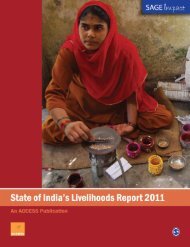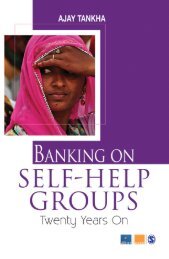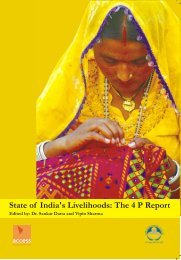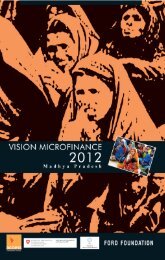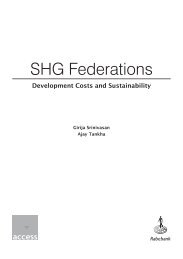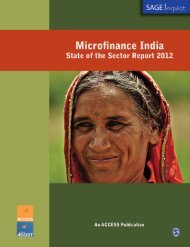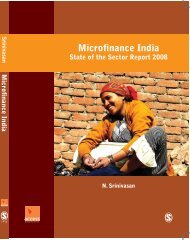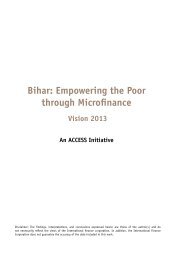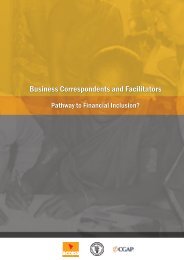Download sector_report1.pdf - Microfinance and Development ...
Download sector_report1.pdf - Microfinance and Development ...
Download sector_report1.pdf - Microfinance and Development ...
You also want an ePaper? Increase the reach of your titles
YUMPU automatically turns print PDFs into web optimized ePapers that Google loves.
Issues <strong>and</strong> priorities for action research<br />
A major issue is how competitive MFIs are with informal private operators in large centres like<br />
Surat. There are very few reported cases of fraud against informal operators who depend on<br />
reputation to maximize business <strong>and</strong> profits. Moreover in Surat, their service is superior for<br />
the same cost, in the case of remittances in a certain size bracket, although the charge is<br />
slightly higher for the slightly smaller, average-sized remittance. On the other h<strong>and</strong>, Surat may<br />
be exceptional in the degree of competition that prevails between operators. Second, Adhikar<br />
has the potential advantage that it offers loans to members, both in Gujarat <strong>and</strong> in Orissa, as<br />
well as insurance. 5 Thus it enjoys the advantage of economies of scope over informal competitors.<br />
It is in the process of exp<strong>and</strong>ing operations in Orissa to new blocks, <strong>and</strong> also to neighbouring<br />
Ganjam district, <strong>and</strong> has plans to recruit more agents in Surat.<br />
A second issue has to do with the scope for MFIs to enter remittances as an area of operations<br />
in the country at large. There is a need to identify major inter-state migration corridors in the<br />
country so as to identify other large concentrations of migrants from particular originating<br />
areas. 6 Although there are not many MFIs that have a presence in both originating <strong>and</strong><br />
destination areas like Adhikar, there is scope, as noted above, for tie ups between MFIs in<br />
different sets of origin-destination pairs, or between MFIs <strong>and</strong> banks in either the originating<br />
<strong>and</strong> destination areas. Approval for such tie-ups between banks <strong>and</strong> MFIs already exists in the<br />
Business Correspondent model (see Chapter 7A) <strong>and</strong> there is a need to study what has kept the<br />
banks out of them so far. 7 With the several new <strong>and</strong> potentially large urban MFIs being set up,<br />
the scope for such tie-ups should increase further.<br />
Second, many of the larger MFIs are now establishing multi-state operations. 8 Third, there is<br />
substantial migration within states, <strong>and</strong> large state-wide MFIs might become interested in<br />
providing a remittance service to borrowers in different locations. In Assam for instance,<br />
RGVN (see Chapter 8A), is planning to introduce remittances as a service to its approximately<br />
35,000 Credit <strong>and</strong> Savings Programme members spread over 10 districts of the state. Remittances<br />
will be delvered initially only to other members, either using email or telephone, for a proposed<br />
fee of 1.5 percent. Delivery is expected to be completed within 24 hours.<br />
The third issue is that of regulation. In the case of lending it is the MFI that incurs the risk,<br />
whereas in the case of remittances, as with savings, the risk is incurred by the client. However,<br />
as with MFI savings, the client is usually not only also a borrower, but one whose outst<strong>and</strong>ing<br />
loan often exceeds the remittance amount. Thus he is a net borrower. This greatly reduces the<br />
prudential concern. In Adhikar's case remitters are often borrowers at both ends (through<br />
their dependent families at the destination end). In order to encourage ease of entry <strong>and</strong><br />
competition among international money transfer operators (MTOs) so as to lower the cost of<br />
remittances (which have been found to be price elastic, <strong>and</strong> which amount to more than the<br />
value of development assistance received by developing countries) the UK regulators make a<br />
clear distinction between remittances <strong>and</strong> savings by excluding the former from the definition<br />
of the latter as long as they are not held for less than 3 days. (World Bank 2006). Also, UK<br />
regulations do not lay down any net worth requirements for MTOs. These should be examined<br />
by the framers of the proposed <strong>Microfinance</strong> Act.<br />
Migrants have a vast range of problems, including lack of employment <strong>and</strong> physical insecurity,<br />
separation from families <strong>and</strong> children, lack of housing <strong>and</strong> sanitation <strong>and</strong> educational<br />
96






